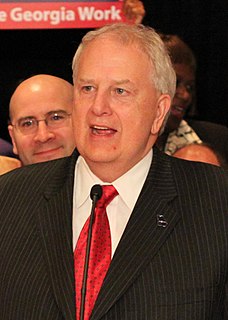A Quote by Roy Barnes
And one of the things I've tried to do in my first months in office is to give more Georgians - reporters and members of the general public alike - a closer look at how their government works.
Related Quotes
Those of us in public office and those of us who aspire to public office have a responsibility to be reasonable, fact-based, in our rhetoric and to not suggest things that are unreasonable, to whip up a lot of emotion in public, which can lead to government overreach, fear, suspicions, and prejudice.
We're not seeing, you know, dozens of reporters being beaten up. And there may be more attention to it than there has been in the past. But it is important to recognize that the democracy depends on reporters asking people in power questions, so that the general public has information. We can't really self-govern unless information is widespread. And, sometimes, reporters have to be a little aggressive. I mean, you know, the reporter didn't beat up the politician. The politician beat up the reporter.
I am suspicious and disillusioned about the uses and misuses of photography in the art world, the press, and the world of entertainment. And to make things more complicated, I don't think that the general public is well educated regarding images. Generally we are taught how to read, but we are not taught how to look.
The left wants you to believe that true morality is defined by how much money you give the government, how much money you pay the government, how much money the government gets from you, because only the government does good stuff, only the government does good works, only the government cares about people. It's bogus.
A free society depends upon a high degree of mutual trust. The public will not give that trust to officials who are not seen to be impartially dedicated to the general public interest, nor will they give trust to those high in government who violate the rule of law they ask citizens to obey at the expense of self-interest, or to those who present government as the place where one feathers his own nest, [or] exchanges favors with friends and former associates.
In general, when you have success on the field, you're more popular, and you have that fame that comes with it. You realize you're in the public eye more, and you've got to be a little bit more careful about some of the things you're doing out in public and make sure you're smart about the things you say.
Because it is a monopoly, government brings inefficiency and stagnation to most things it runs; government agencies pursue the inflation of their budgets rather than the service of their customers; pressure groups form an unholy alliance with agencies to extract more money from taxpayers for their members. Yet despite all this, most clever people still call for government to run more things and assume that if it did so, it would somehow be more perfect, more selfless, next time.
If you look at coastlines, if you look at that them from far away, from an airplane, well, you don't see details, you see a certain complication. When you come closer, the complication becomes more local, but again continues. And come closer and closer and closer, the coastline becomes longer and longer and longer because it has more detail entering in.


































